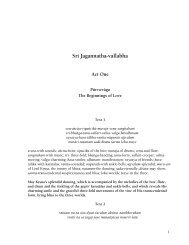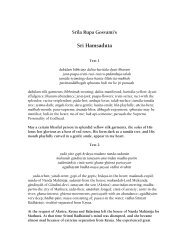Srimad Bhagavatam, Volume 3
Srimad Bhagavatam, Volume 3
Srimad Bhagavatam, Volume 3
Create successful ePaper yourself
Turn your PDF publications into a flip-book with our unique Google optimized e-Paper software.
<strong>Srimad</strong> Bhagawatam, First Canto, <strong>Volume</strong> Three<br />
for mischief and Maharaj Parikshit was meant for subduing all kinds of<br />
mischief mongers specially the personality of Kali. It was better therefore, for<br />
the personality of Kali to have become killed by the king then and there<br />
instead of being killed anywhere else. He was after all a surrendered soul<br />
before the king and it was with the king to do the needful.<br />
Tat me dharmabhritam srestha sthanam nirdestum arhasi<br />
Yatra eva niyato vatsye atisthams te anusasanam<br />
Tat—therefore, Me—unto me, Dharmabhritam—of all the protectors of<br />
religiosity, Srestha—the chief, Sthanam—place, Nirdestum-to ascertain,<br />
Arhasi—may you do so, Yatra—where, Eva—certainly. Niyato—always,<br />
Vatsye—can reside, Atisthams—permanently situated, Te—your,<br />
Anusasanam—under your rule.<br />
Therefore oh the chief amongst the protector of religiosities, your majesty<br />
may fix up some places for me where I can live permanently situated<br />
under the protection of your government.<br />
The personality of Kali addressed Maharaj Parikshit as the chief amongst the<br />
protectors of religiosity because the king refrained from killing a person who<br />
surrendered unto him. A surrendered soul should be given all protection even<br />
though he may be an enemy. That is the principle of religion And we can just<br />
imagine what sort of protection is given by the Personality of Godhead to the<br />
person who surrenders unto Him not as an enemy but as a devoted servitors.<br />
The Lord protects the surrendered soul from all sins or all resultant reactions<br />
of sinful acts. (Bg. 18.64)<br />
Abhyarthitas tada tasmai sthananik alaye dadou<br />
Dyutam panam striyah suna yatra adhamass chaturbidhah.<br />
Abhyarthitas—thus being prayed for, Tada—at that time, Tasmai—unto him,<br />
Sthanani—places, Kalaye—unto the personality of Kali, Dadou—gave him<br />
permission, Dyutam—gambling, Panam—drinking, Striyah—illicit<br />
association of woman, Suna—killing of living beings, Yatra—wherever,<br />
Adharma—irreligiosities, Chaturbidhah—four kinds of.<br />
Suta Goswami said, "Maharaj Parikshit, thus being prayed for by the<br />
personality of Kali, gave him permission to reside in four different places<br />
where gambling, drinking, prostitution and slaughtering of animals<br />
performed respectively."<br />
The basic principles of irreligiosities such as pride, prositution, intoxication<br />
and falsehood respectively counteracts the four principles of religiosities<br />
namely austerity, cleanliness, mercy and truthfulness, the Personality of Kali<br />
was given permissson to live in four places particularly mentioned by the king<br />
namely the place of gambling, the place of prostitution, the place of drinking<br />
and the place of slaughtering the animals.<br />
Srila Jiba Goswami directs that drinking against the principles of scriptures<br />
such as Soutramani yajna etc, association with woman except the married one,<br />
killing of animals against injunction of scripture, are irreligious. In the Vedas<br />
two different types of injunctions are there for the Pravittas or those who are<br />
engaged in the matter of material enjoyment and for the Nrivittas or those<br />
who are engaged in the matter of liberation from material bondage. The Vedic<br />
injuction for the Pravittas are to regularise their activities towards the path of<br />
liberation by gradual process. Therefore, for the persons who are in the lowest<br />
stage of ignorance and indulge in the matter of wine, woman and flesh, for<br />
them drinking by performing Sroutamani yajna, association of woman by<br />
marriage and flesh eating by sacrifices are sometimes recommended. But such<br />
recommendations in the Vedic literature are meant for a particular class of<br />
men and not for all. But because they are injuctions of the Vedas for such<br />
particular type of persons such activities by the Pravittas are not considered<br />
Adharma. One man's food may be poison for other; similarly what is<br />
recommended for the persons in the modes of ignorance may be poison for<br />
the persons in the modes of goodness. Srila Jiva Goswami Prabhu, therefore,<br />
affirms that recommendations of the scriptures, for a certain class of men, are<br />
never to be considered as Adharma or irriligion. But such activities are<br />
factually Adharma and they are never meant for being encouraged. The<br />
recommendation in the Scriptures are not meant for encouragement of such<br />
Adharmas but they are meant for regularising the necessary Adharmas<br />
gradually towards the path of Dharma.<br />
Following the foot prints of Maharaj Parikshit, it is the duty of all executive<br />
heads of states to see that the principles of religiosities namely austerity,<br />
cleanliness, mercy and truthfulness be established in the state and the<br />
principles of irreligiosities namely pride, illicit womanly association or<br />
prostitution, intoxication and falsity be checked by all means. And to make<br />
the best use of a bad bargain the personality of Kali may be transferred to<br />
places of gambling, drinking, prostitution and slaughter houses if there is any<br />
place like that. Those who are addicted to these irreligioos habit may be<br />
regularised by the injunctions of the Scripture for restraining them and in all<br />
circumstances they may not be encouraged by any state. In other words the<br />
state should categorically stop all sorts of gambling, drinking, prostitution and<br />
falsity as a matter of fact. On the contrary the state which wants to eradicate<br />
corruption by majority may introduce the principles of religiosity in the<br />
following manner:<br />
52<br />
1. Two compulsory fasting days in a month if not more (austerity). Even<br />
from economic point of view such two fasting days in a month in the state<br />
will save tons of food grains and the system will act very favourably on the<br />
general health of the citizens also.<br />
2. There must be compulsory marriage of young boys and girls attaining 24<br />
years of age and 16 years of age respectively. There is no harm of coeducation<br />
in the schools and colleges provided the boys and the girls are duly<br />
married and in case there is any intimate connection between a male and<br />
female student they may be married properly without allowing them for any<br />
illicit relation. The divorce act is encouraging prostitution and this should be<br />
abolished.<br />
3. The citizens of the state must give in charity up to 50% of their income<br />
for the purpose of creating spiritual atmosphere in the state or in the human<br />
society both individually and collectively. Preaching of the principles of<br />
Bhagwatam by (a) Karmayoga or doing everything for the satisfaction of the<br />
Lord (b) regular hearing of the <strong>Srimad</strong> Bhagwatam from authorised persons or<br />
realised souls (c) Chanting of the glories of the Lord congregationally at home<br />
or at places of worship (d) rendering of all kinds of service to person<br />
Bhagwatas engaged in the matter of preaching <strong>Srimad</strong> Bhagwatam (e) and<br />
residing in a place where the atmosphere is saturated with god-consciousness.<br />
If the state is regularised by the above process, naturally there will be god-<br />
Consciousness everywhere.<br />
Gambling of all description even specalative business enterprises are<br />
considered to be gambling and by encouraging this gambling in the state there<br />
is complete disappearance of truthfullness. Allowing young boys and girls to<br />
remainr unmarried more than the abovementioned ages and licence for animal<br />
slaughter houses of all description shall be at once closed. The flesh-eaters<br />
may be allowed to take flesh as they are mentioned in the scriptures and not<br />
otherwise; as by purchasing from the market and thus encourage unrestricted<br />
flesh-eating strictly be stopped. Intoxication habit of all description even<br />
smoking of Bidis and cigarettes chewing of pan or drinking tea, must be<br />
prohibited.<br />
Punas cha yachamanaya jatarupam adat prabhu<br />
Tato anritam madam kamam rajo vairam cha panchamam.<br />
Panas—again, Cha—also, Yachamanaya—unto the beggar, Jatarupam—<br />
Gold, Adat—gave away, Prabhu—the king, Tato—where by, Anritam—<br />
falsehood, Madam—intoxication, Kamam—lust, Rajo—on account of<br />
passionate mood, Vairam—enmity, Cha—also, Panchamam—the fifth one.<br />
The personality of Kali asked for something more and on his begging so<br />
the King gave him permission to live where there is gold. Because<br />
wherever there is gold there are falsity, intoxication, lust, enviousness and<br />
at last all enmity.<br />
Although Maharaj Parikshit gave Kali permission to live in four places, it was<br />
very difficult for the personality of Kali to find out the places. Because during<br />
the reign of Maharaj Parikshit there was no such place at all. Therefore Kali<br />
asked the king to give him something practical which may be utilised for his<br />
nefarious purposes. Maharaj Parikshit thus being requested by him gave<br />
permission to live in a place where there is gold because wherever there is<br />
gold there are all the abovementioned four things and over and above them<br />
there is enmity also. So the personality of Kali became gold standardised.<br />
According to <strong>Srimad</strong> Bhagwatam stocking of gold any where means<br />
encouraging falsity, intoxication, prostitution enviousness, and enmity. Even<br />
gold-standard exchange and currency is bad. Gold standard currency is based<br />
on falsehood because currency is not on the par of the reserved gold. The<br />
basic principle is falsity because currency notes are issued more in value than<br />
the actual reserved gold. This artificial inflation of currency by the authorities<br />
encourages prostitution of state economy. Price of consumers Commodity<br />
becomes artificially inflated on account of bad money or artificial currency<br />
notes. Bad money drives away good money is an economical law. Instead of<br />
paper currency actual gold coins should be used for exchange and this will<br />
stop prostitution of gold. Gold ornaments for women may be allowed by<br />
control not by quality but by quantity. This will discourage lust, enviousness<br />
and enmity. When there is actual gold currency in the form of coins, the<br />
influence of gold for producing falsity, prostitution etc. will automatically<br />
cease and there will be no need of anticorrup tion ministry for another term of<br />
prostitution and falsity of purpose.<br />
Amuni pancha sthanani hi adharmai prabhavah kalih<br />
Outtareyena dattani nyavasat tat nidesakrit.<br />
Amuni—all those, Pancha—five, Sthanani—places, Hi—certainly,<br />
Adharma—irreligious principles, Prabhavah—encouraging, Kali—the age of<br />
Kali, Outtareyena—by the son of Uttara, Dattani—delivered by, Nyavasat—<br />
dwelt, Tat—by him, Nidesakrit—direeted by.<br />
As such the personality of Kali was allowed by the direction of King<br />
Maharaj Parikshit the son of Uttara, to live in those five plaees as<br />
described above.<br />
Thus the age of Kali began with gold standardisation and therefore falsity,<br />
intoxication, animal slaughter and prostitution are rampant all over the world












